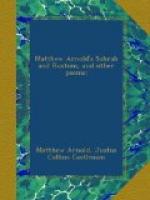In the meantime Arnold’s pen had not been idle. His first volume of verse, The Strayed Reveller and Other Poems, appeared (1848), and although quietly received, slowly won its way into public favor. The next year the narrative poem, The Sick King in Bokhara, came out, and was followed in turn by a third volume in 1853, under the title of Empedocles on Etna and Other Poems. By this time Arnold’s reputation as a poet was established, and in 1857 he was elected Professor of Poetry at Oxford, where he began his career as a lecturer, in which capacity he twice visited America. Merope, a Tragedy (1856) and a volume under the title of New Poems (1869) finish the list of his poetical works, with the exception of occasional verses.
Arnold’s prose works, aside from his letters, consist wholly of critical essays, in which he has dealt fearlessly with the greater issues of his day. As will be seen by their titles (see page xxxviii of this volume), the subject-matter of these essays is of very great scope, embracing in theme literature, politics, social conduct, and popular religion. By them Arnold has exerted a remarkable influence on public thought and stamped himself as one of the ablest critics and reformers of the last century. Arnold’s life was thus one of many widely diverse activities and was at all times deeply concerned with practical as well as with literary affairs; and on no side was it deficient in human sympathies and relations. He won respect and reputation while he lived, and his works continue to attract men’s minds, although with much unevenness. It has been said of him that, of all the modern poets, except Goethe, he was the best critic, and of all the modern critics, with the same exception, he was the best poet. He died at Liverpool, where he had gone to meet his daughter returning from America, April 15, 1888. By his death the world lost an acute and cultured critic, a refined writer, an earnest educational reformer, and a noble man. He was buried in his native town, Laleham.
Agreeably to his own request, Arnold has never been made the subject for a biography. By means of his letters, his official reports, and statements of his friends, however, one is able to trace the successive stages of his career, as he steadily grew in honor and public usefulness. Though somewhat inadequate, the picture thus presented is singularly pleasing and attractive. The subjoined appreciations have been selected with a view of giving the student a glimpse of Arnold as he appeared to unprejudiced minds.
One who knew him at Oxford wrote of him as follows: “His perfect self-possession, the sallies of his ready wit, the humorous turn which he could give to any subject that he handled, his gaiety, audacity, and unfailing command of words, made him one of the most popular and successful undergraduates that Oxford has ever known.”
“He was beautiful as a young man, strong and manly, yet full of dreams and schemes. His Olympian manners began even at Oxford: there was no harm in them: they were natural, not put on. The very sound of his voice and wave of his arm were Jove-like.”—Professor Max MUeLLER.




